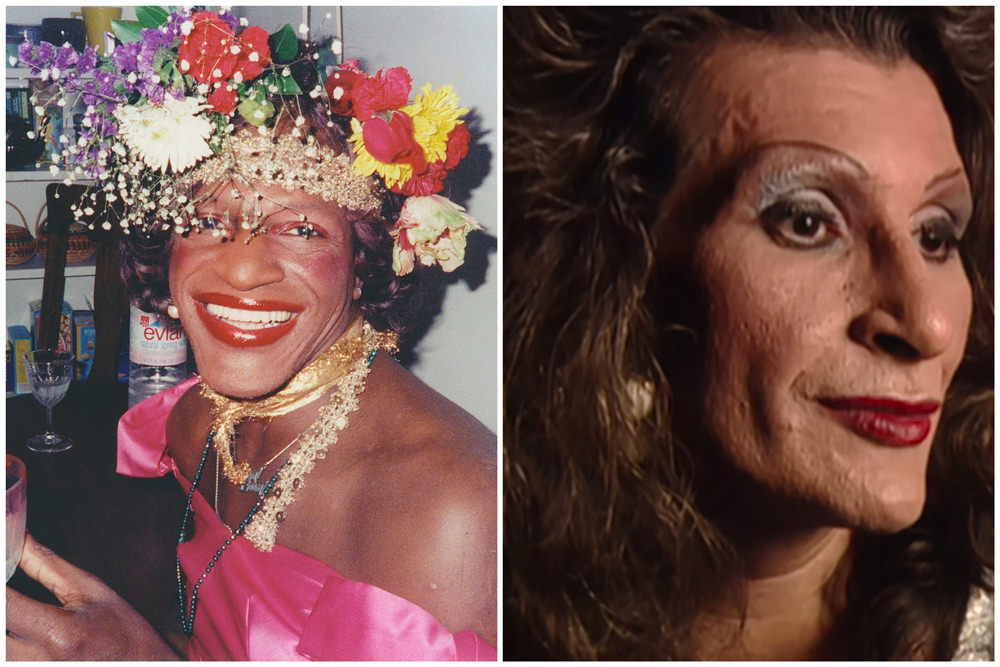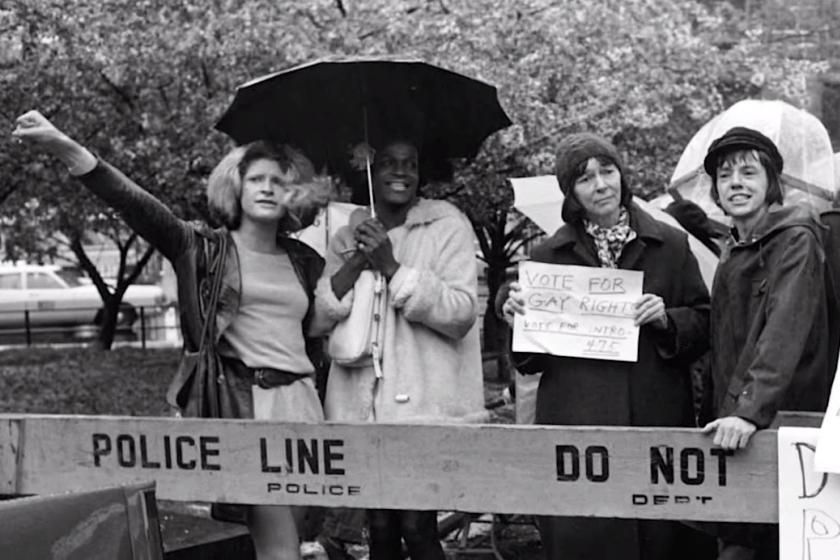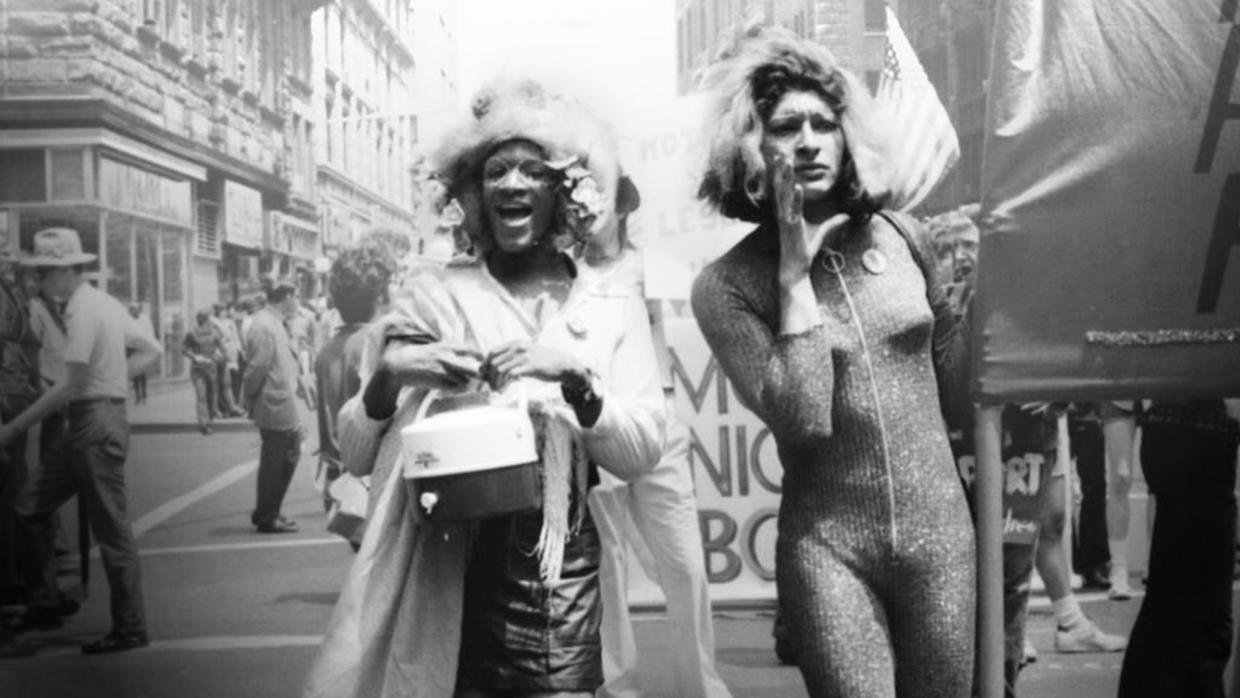
Last week, it was announced that two of the mothers of the modern LGBTQ rights movement are finally getting the kind of legend-making tribute they both deserve. Marsha P. Johnson and Sylvia Rivera will have statues erected in their honor near the site of the Stonewall Riots in New York. It is long past time for the names and work of these two women to be universally known and it is perfectly appropriate and correct that the tribute itself is as revolutionary in its own way as the two women it’s celebrating. Marsha and Sylvia were both drag performers and tireless community advocates and political organizers whose involvement in – and clashes with – the modern post-Stonewall gay rights movement helped set the modern transgender rights movement into motion and established a legacy of righteous anger that has only proven them to be more correct than people ever gave them credit for during their lives.
Marsha was a beatific figure in the West Village queer scene of the ’60s through the ’80s, a sparkling, colorful light-bringer who was beloved by practically everyone who knew her. Marsha, like many transgender women who found employment and housing opportunities routinely denied them, engaged in sex work to get by when her performing couldn’t pay the bills. Once, while appearing before a judge on the charge of soliciting, she responded to his query regarding her middle initial by telling him it stood for “Pay it no mind.” He reportedly found this so amusing he let her go. Because she had little in the way of money for her entire adult life, Marsha’s form of drag was very much of the DIY, home-grown variety. RuPaul has called her “the mother of us all,” but we don’t think Marsha would have known what to make of modern drag, with its sickening lewks and thousands of dollars worth of costumes. She was known to string Christmas garland or flowers in her hair in lieu of wigs or high drag; putting together her look with whatever she could find and paying it no mind at all. Legend has it that she was sitting in the Stonewall Inn on that legendary night of June 28, 1969, celebrating her birthday, when the cops came in to harass the queer folks (as cops liked to do). Further legend has it that she helped kick off the rioting by picking up a shot glass and throwing it at the bar mirror while screaming “I WANT MY CIVIL RIGHTS!” It has been called “the shotglass heard round the world.”

At the time of the Stonewall Riots, Sylvia Rivera was a young, femme queen bopping around the West Village. When she heard about the throw-down at the Stonewall, she was said to yell with delight “It’s the revolution!” before immediately heading down to join in on the fun. Marsha and Sylvia immediately inserted themselves into the nascent gay rights movement that blossomed almost immediately following the riots. The movement, however, was not particularly interested in centering the voices of black or LatinX transgender women, to its everlasting shame. The early years of the gay rights movement (and many would argue, the entire half-century history of it) centered a form of respectable, assimilative homosexuality in a belief that equal rights would be granted to the most “normal” members of the community, which were defined – surprise, surprise – as white cisgender gay people. Sylvia and Marsha were both active in the early precursors to today’s LGBTQ rights organizations, the newly formed Gay Activists Alliance and Gay Liberation Front. But because they were so concerned with the legal rights and well-being of transgender women, they found little support within those groups and, in the manner of legends, struck out on their own to form S.T.A.R., the Street Transvestites Action Revolutionaries in 1970 to provide safety, housing and advocacy on behalf of their largely ignored sisters. When the trailer they secured as shelter for their sisters was towed away, they somehow managed to secure an entire building for them, using their own bodies to turn tricks and raise funds.
In 1973, at the Christopher Street Parade (the earliest pre-cursor to today’s Pride parades), Sylvia spent all day waiting for an opportunity to address the crowd, her frustration rising as she kept getting bumped or pushed back on the speaker’s roster. Eventually, exhausted and angry, she was able to take the mic and vent her frustrations on the entire gay rights movement in a speech that has since passed into legend as an example of the kind of defiance, anger, and fierce inclusion that was most needed in the early gay liberation movement. It’s been called the “Y’all Better Quiet Down Now” speech and every single person with even a passing interest in queer history and the modern LGBTQ rights movement needs to watch it (which you can do here). After venting her rage at a crowd of gays who didn’t want to hear it, Sylvia went home and tried to kill herself. Marsha found her, got her help and saw her through her healing. They continued to fight ever on, for decades; ceaselessly standing up for themselves, for queer people generally, and for transgender women specifically, for the rest of their lives.
Marsha’s body was found floating in the Hudson River in 1992, during Pride weekend. The police ruled her death a suicide, but her friends – including Sylvia – insisted she was murdered. Given the high rates of violence and murder committed against transgender women and especially transgender women of color up to the present day, as well as the increased risk of suicide among queer and transgender people that continues to the present day, either version of Marsha’s death can serve as a testament to the fight she was leading her whole life. Her life, her friendship with Sylvia and the circumstances of her death are all well-documented in the 2017 documentary The Death and Life of Marsha P. Johnson, which can be streamed on Netflix.

Sylvia, who was known to declare that she would never forgive the gay rights movement for what it did to her and her family, nevertheless continued to fight on for the rest of her life, on behalf of her people. She died in 2002 at the age of 50 from complications from liver cancer. Today, the Sylvia Rivera Law Project continues her work, fighting in her name for legal protections for her transgender and non-binary siblings.
Legends now, legends then, legends forevermore. Every queer person on the planet owes them both a debt of gratitude, not only for working so hard to make the movement inclusive to everyone, but for demonstrating the fierce bonds of queer sisterhood and the fiery personalities needed to raise up a people from social genocide to social acceptance. While it’s a striking testament to their lives to make them the subjects of the first public statues erected to transgender women of color in America, until their faces are carved into a mountainside somewhere, any tribute to their greatness is going to fall a little short. This year – and every year – during Pride celebrations, raise a fist or a shotglass in their honor, would you?
“Our book Legendary Children: The First Decade of RuPaul’s Drag Race and the Last Century of Queer Life is on sale now!
The Los Angeles Times called it “a nuanced exploration of the gender-bending figures, insider lingo and significant milestones in queer history to which the show owes its existence.” The Washington Post said it “arrives at just the right time … because the world needs authenticity in its stories. Fitzgerald and Marquez deliver that, giving readers an insight into the important but overlooked people who made our current moment possible.” Paper Magazine said to “think of it as the queer education you didn’t get in public school” and The Associated Press said it was “delightful and important” and “a history well told, one that is approachable and enjoyable for all.”
T Lo’s Weekend Pop Culture Reading List Next Post:
Chris Hemsworth and Tessa Thompson at the “Men in Black: International” London Photocall
Please review our Community Guidelines before posting a comment. Thank you!


